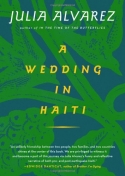BKMT READING GUIDES
A Wedding in Haiti
by Julia Alvarez
Hardcover : 304 pages
0 club reading this now
0 members have read this book
Introduction
Julia Alvarez has been called ?a one-woman cultural collision? by the Los Angeles Times Book Review, and that has never been truer than in this story about three of her most personal relationships?with her parents, with her husband, and with a young Haitian boy known as Piti. A teenager when Julia and her husband, Bill, first met him in 2001, Piti crossed the border into the Dominican Republic to find work. Julia, impressed by his courage, charmed by his smile, has over the years come to think of him as a son, even promising to be at his wedding someday. When Piti calls in 2009, Julia's promise is tested.
To Alvarez, much admired for her ability to lead readers deep inside her native Dominican culture, ?Haiti is like a sister I?ve never gotten to know.? And so we follow her across the border into what was once the richest of all the French colonies and now teeters on the edge of the abyss?first for the celebration of a wedding and a year later to find Piti's loved ones in the devastation of the earthquake. As in all of Alvarez's books, a strong message is packed inside an intimate, beguiling story, this time about the nature of poverty and of wealth, of human love and of human frailty, of history and of the way we live now.
Mark Kurlansky, the bestselling author of The Food of a Younger Land, Cod and the upcoming Birdseye: The Adventures of a Curious Man, interviews Julia Alvarez about A Wedding in Haiti.

Mark Kurlansky: As a Dominican growing up around Haitians and next door to Haiti what was your impression of Haiti and Haitians and what surprised you when you went there?
Actually, there weren't many Haitians around when I was growing up in the 50s, under the dictatorship of Trujillo. The border had been closed since the massacre of 1937, when Haitians living on the Dominican side were killed by the military (from 4,000 to 40,000--the figures vary wildly).
I knew only one Haitian, Chucha, who was the nanny over at my cousins' house. The story was that during the massacre, Chucha had walked all the way from the southwest border to the capital and knocked at my great aunt's door, asking for asylum. My great aunt took her in. Chucha stayed for the rest of her life. When she was in a good mood, Chucha told incredible stories. So, that was my impression of our neighbor country: a place of cranky people who could tell the best stories.
What I absorbed from the culture was that Haiti was the benighted country next door, where Vodou was the religion, instead of our enlightened Christianity. Haitians were the "real blacks," whereas black Dominicans were "indios oscuros" (dark Indians). Haiti was the enemy who had invaded us and occupied our country for twenty-two years. (Interestingly, Dominicans celebrate their independence, not from their colonizer Spain, but from Haiti.) At night, when I didn't want to go to sleep, I'd be threatened with the Haitian cuco (boogeyman) who was going to come take me away to Haiti. Of course, this threat only served to pique my interest!
Given that I was curious about Haiti, I'm surprised that I didn't make more of an effort to go "next door" when I returned often to the D.R. All the red tape required to cross the border discouraged me, but I think there was also a subliminal fear and shame based on the 1937 massacre, never fully acknowledged by my country. I assumed that as someone of Dominican heritage and white, I would be unwelcomed, until I was invited by Piti to attend his wedding.
What surprised me were the many similarities between Haiti and the D.R.--despite our different histories, languages, cultures. Haitians were making casave, a staple of the Dominican diet as well. Their beer, Prestige, tasted like our beer, Presidente. (Even the names had a similar ego-boosting feel to them!) The sayings, which are the way popular wisdom gets passed down in our oral cultures, were often the same ones in Kreyòl as in Spanish. These might seem superficial things, but they signaled a deep connection between our two countries.
I was impressed by how much more resourceful the Haitians were. As a poorer country, they don't waste anything. The culture, especially out in the countryside, is less "corrupted" by Americanized and globalized influences. No McDonalds or Kentucky Fried Chickens, no ads for Coke, though we did see a big truck with OBAMA painted on the side of the trailer.
Read the rest of the interview
Discussion Questions
No discussion questions at this time.Book Club Recommendations
Recommended to book clubs by 0 of 0 members.
Book Club HQ to over 90,000+ book clubs and ready to welcome yours.
Get free weekly updates on top club picks, book giveaways, author events and more








